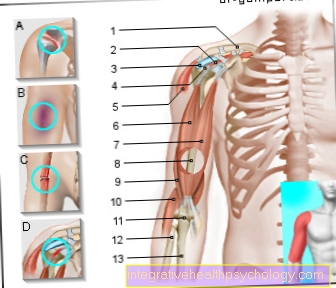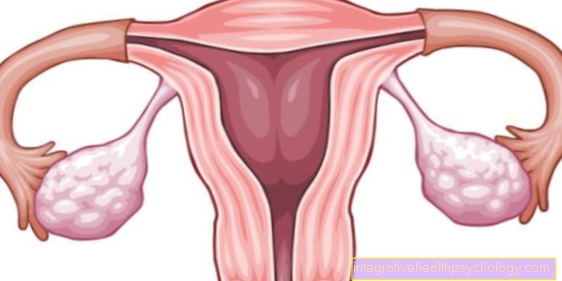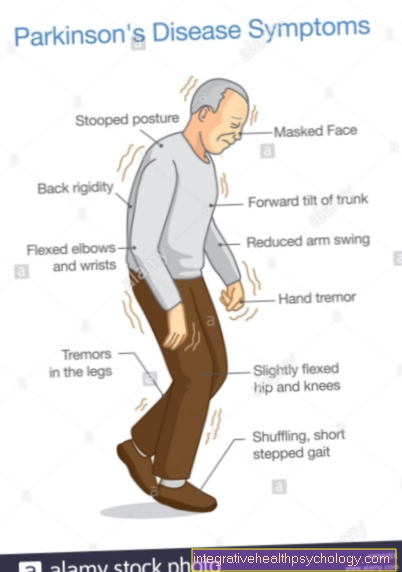Side effects of Xarelto®
introduction
Xarelto® is a drug with the active ingredient rivaroxaban. This is a NOAC, i.e. a new drug for oral anticoagulation, commonly known as blood thinning.
Anticoagulation is a serious, but in many cases necessary, interference with the functioning of the body, blood clotting and therefore has some side effects and possible complications. These range from intolerance to severe bleeding. In the event of severe side effects, the attending physician should always be consulted and the dose should not be changed independently.
Read more on the topic: Anticoagulants

Side effects of Xarelto®
The side effects of Xarelto® can be broken down according to frequency.
Common side effects are:
- Anemia
- Dizziness and headache
- Eye and conjunctival hemorrhage
- Epistaxis
- Bleeding gums
- Bleeding in the gastrointestinal tract
- Nausea and vomiting
- Constipation or diarrhea
- itching
- Extremity pain
- Blood in the urine
- fever
- Water retention
- Fatigue and bleeding after surgery
Uncommon side effects are:
- Changes in blood count
- allergic reaction
- Cerebral hemorrhage
- Liver dysfunction
Rare side effects are:
- Jaundice
- Muscle bleeding
- Inflammation of the liver
Very rare side effects are:
- allergic shock
- Stevens-Johnson Syndrome
- DRESS syndrome
Gastrointestinal bleeding
Bleeding in the gastrointestinal tract can have a number of causes. Often, minor injuries or protrusions are the cause. Stomach ulcers and tumors can also bleed. Taking Xarelto® does not increase the likelihood of bleeding, but prevents the bleeding from stopping and therefore leads to greater blood loss, which is more likely to be noticed.
Such bleeding shows up either through black stools, so-called tarry stools, or, in the case of deeper causes, through fresh blood in the stool. If you vomit, the vomit may look like coffee grounds. In either case, the root cause of the bleeding must be found.
Read more on the subject at: Gastrointestinal bleeding
Epistaxis
Especially in the cold season, the mucous membranes of the nose are often irritated and dry. In the case of slight irritation, such as blowing your nose, the veins can burst and bleed. People who take Xarelto® may have more bleeding because Xarelto® has a blood-thinning effect. This can lead to a great deal of blood loss.
The bleeding can often be stopped by local compression, i.e. squeezing the nose. If the bleeding does not stop, a doctor should be consulted or if the bleeding is very heavy and the associated circulatory problems, the emergency services should be notified.
Hematomas
Hematomas, colloquially known as bruises, are ruptured blood vessels beneath the skin. In blunt injuries, blood can collect under the skin and break down within a few days. When taking Xarelto®, bleeding takes longer to stop, which is why even small bumps lead to particularly large bruises. Even after blood has been drawn, people often develop large bruises. These are not dangerous and the blood is broken down normally. Due to the slower hemostasis, those affected have the feeling of developing hematomas much more frequently, but these are only visible more clearly.
Also read the article on the topic: Hematoma
Blood loss after surgery
Operations are always associated with a risk of bleeding and also with a risk of rebleeding. When taking Xarelto®, this risk increases because natural hemostasis is restricted. During an operation, injuries are inflicted on the body in a targeted manner, which are sewn up, but only finally heal later. During major operations with a high risk of bleeding, it may be necessary to temporarily discontinue Xarelto®. A doctor should always be consulted in the event of secondary bleeding. No direct antidote to the effects of Xarelto® is available, so the bleeding must be treated symptomatically.
Lack of blood
Since there is a high risk of bleeding all over the body when taking Xarelto®, those affected often lose small amounts of blood in different places. Small bleeding in the gastrointestinal tract, bruises and nosebleeds therefore lead to blood loss that the body cannot always compensate for directly. Those affected therefore develop anemia, i.e. anemia. In severe cases, this anemia must be corrected with blood products. Blood formation can also be increased by medication.
Read more on the topic: Anemia
fatigue
Fatigue is a typical symptom of anemia, which is a relatively common side effect when taking Xarelto®. The red blood cells transport oxygen in the body and the brain in particular needs a lot of oxygen. Frequent bleeding therefore leads to the loss of red blood cells and thus to a poorer oxygen supply. The brain saves oxygen by reducing its performance and making those affected feel tired and limp.
a headache
Headaches are also one of the common side effects when taking Xarelto®. This is due, on the one hand, to the poorer oxygen supply to the brain and thus to concentration disorders, and to visual disturbances due to bleeding.
In the event of severe headaches after bumping the head, those affected should go to a hospital straight away, as taking Xarelto® increases the likelihood of cerebral hemorrhage. Relatives should also be aware of this risk and should call the emergency number in the event of abnormalities after falling on their head.
dizziness
Dizziness can arise in the brain as well as in the inner ear. Taking Xarelto® can lead to an insufficient supply of oxygen to the brain, which can also lead to dizziness. If dizziness worsens with further symptoms, cerebral hemorrhage is also a possible cause, as this can occur more frequently when taking Xarelto® than in people who do not take this drug. In the event of dizziness, the person affected should not go to the doctor alone, as the risk of falling is increased. Transport with an ambulance company can be particularly useful for people with an already increased tendency to fall.
Muscle and joint pain
When taking Xarelto®, the probability of bleeding increases in all areas of the body. With minor injuries, which usually do not lead to excessive bleeding, those affected develop bruises. This also happens in joints and muscles and therefore often leads to pain when exercising after exercise or minor injuries. With larger blunt injuries, there is a risk of compartment syndrome. This is a constriction of nerves and muscle tissue due to increased bleeding and represents an acute danger. In the event of significant movement restrictions, the attending physician should be consulted.
Hair loss
The frequent small bleeding throughout the body can lead to a blood deficiency, i.e. anemia, when taking Xarelto®, as the new formation of blood cannot keep up with the loss. This leads to a lack of oxygen throughout the body. The body prioritizes which cells are essential for life and are therefore supplied with oxygen first.
Since hair is not essential for life, the hair follicles are poorly supplied with even a slight deficiency and the hair will fall out. The formation of blood can be stimulated by certain dietary supplements and medication and thus hair loss can be stopped. However, it is important that major sources of bleeding are identified and the cause is combated.
Also read the article on the topic: Hair loss therapy
Increased liver function
Taking Xarelto® leads to an increase in transaminases (liver enzymes) in around a tenth of those affected. However, as long as there are no further symptoms, this has no disease value. In some cases, however, other liver values may increase and in rare cases people develop inflammation of the liver, also called hepatitis. This is not an infectious and contagious form of hepatitis, but rather an inflammation caused by the drugs and previous damage to the liver. Affected people stand out with jaundice.
Further information on the subject can be found at: Hepatitis, jaundice
Erectile dysfunction
In the studies on Xarelto®, no direct connection between taking Xarelto and erectile dysfunction could be found. However, erectile dysfunction has many causes and is particularly dependent on the blood flow and the elasticity of the blood vessels. Since men who take Xarelto® often have underlying diseases of the cardiovascular system, the cause of the erectile dysfunction is more likely to be found in these previous diseases.
You might also be interested in this topic: Cause of erectile dysfunction





























